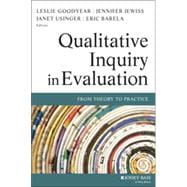Qualitative inquiry can have a major effect on evaluation practice, and provides evaluators a means to explore and examine various settings and contexts in need of rich description and deeper understanding. Qualitative Inquiry in Evaluation: From Theory to Practice explores the most important considerations for both students and evaluation professionals. Using various evaluation theories and approaches as a springboard for real-world practice, this reference serves as an accessible text for beginning students and seasoned professionals alike. Readers are given an in-depth view of the key qualities and benefits of qualitative inquiry, which also serves as a crucial counterpart to quantitative analysis.
Chapters in part one focus on the foundations, core concepts, and intersection of evaluation theory and qualitative inquiry.
Part two contains contributions from leading evaluators whose design, implementation, and reporting strategies for qualitative inquiry are centered on common, real-world settings. These case-based chapters point to the strengths and challenges of implementing qualitative evaluations. Key competencies for conducting effective qualitative evaluations are also discussed.
- Explores the role of qualitative inquiry in many prominent approaches to evaluation
- Discusses the method's history and delves into key concepts in qualitative inquiry and evaluation
- Helps readers understand which qualities are necessary to be an effective qualitative evaluator
- Presents the viewpoints and experiences of expert editors and contributing authors with high levels of understanding on the topic
Qualitative Inquiry in Evaluation: From Theory to Practice is a vital tool for evaluators and students alike who are looking to deepen their understanding of the theoretical perspectives and practice considerations of qualitative evaluation.






